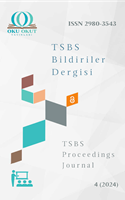Mevsılî’nin el-İhtiyâr li-taʽlîli’l-Muhtâr İsimli Eserinde Kefâet Konusu Üzerine Bir İnceleme
A Study on the Issue of Kefaat in Mawsilī’s al-Ihtiyār li-taʽlīli al-Muhtār
Author(s): Zeliha GüneşSubject(s): History of Law, Sociology of Religion, Sociology of Law, History of Religion, Sharia Law, Qur’anic studies
Published by: Oku Okut Yayınları
Keywords: Islamic Law; Kefaat; Mawsilī; Sociology; Hanafī;
Summary/Abstract: The contribution of faqihs to the development of Islamic law cannot be denied. Although the Nasas have made many clear provisions regarding the social life of the individual, the faqihs have also determined many provisions based on them by jurisprudence. Differences in jurisprudence arising from the jur faqihs ists’ methods of understanding and interpretation of the nafs, as well as differences in reading social life and the change and development in social life over time, have also caused differences in jurisprudence. Changes in social life in society have affected our daily lives, as well as the family structure. Since marriage is directly intertwined with social life, it is important to establish a correct connection between fiqh and social life. As one of the basic phenomena of social life, faqihs have different understandings and approaches to marriage. The sociological perspectives of the faqihs are also influential in their interpretation of the relevant scriptures as well as in their interpretation and evaluation of the social aspects of marriage and the construction of rulings on them. In this respect, this communiqué will discuss and evaluate Mawsilī’s sociological approaches and determinations about the issue of kefaat related to marriage in al-Ihtiyar li-taʽlīli al-Muhtār, which is considered one of the most authoritative books among Hanafīs. It is important to understand the sociological approaches of the faqihs, who guided the society with their fatwas and rulings, by taking into account both the scriptures on the one hand and the phenomena in social life on the other, in order to understand fiqh in general and to make correct determinations when making fiqh rulings today, when our social structure has started to change. Knowing the social life of the period in which the faqihs lived is important in terms of providing information about the issues they paid attention to in basing their rulings on the nasas and how they filled the (legal) gap in that subject by making sociological evaluations in matters not specified in the nasas. The aim of this study is to reach the road map that we should follow on how we should interpret the nasas in the face of current issues that arise in today’s issues by making use of our past fiqh knowledge. The aim of this study is to examine how Maws alMawsīli, as a faqih, had a sociological perspective on the issues that occurred in the period in which he lived, and to interpret the judgments that Maws al-Mawsilī made sociologically by taking into account the social life of the society while justifying the judgments and the social life of the society in the issues that are not specified in the sciences. Mawṣilī’s sociological perspective on the issues was tried to be determined by examining the section on Kefaat from the section on marriage from his work al-Ihtiyar li-taʽlīli al-Muhtār. Mawsili’s sociological approach, which he especially emphasizes on the issue of kefaat, which is one of the necessary conditions of marriage, is to ensure that the family, which is the cornerstone of society, is established on solid foundations with his comments on the observance of equality in marriage, to ensure that the purposes of marriage are achieved, and to eliminate the embarrassment and awkwardness of the woman and her guardian in the eyes of the society as a result of the marriage contract made by the woman with a person who is not her equal.
Journal: TSBS Bildiriler Dergisi
- Issue Year: 2024
- Issue No: 4
- Page Range: 209-222
- Page Count: 14
- Language: Turkish

